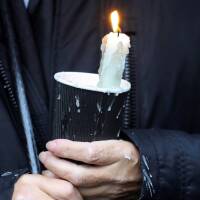In Parched Southern Africa, Coronavirus Spurs Action on Water Supply
This story was originally published May 6, 2020 by the Thomson Reuters Foundation.
Fifty people and their cattle share the only borehole in Gongu village in southwestern Zimbabwe, meaning frequent handwashing to fight the coronavirus is easier said than done.
Across drought-hit southern Africa, COVID-19 has spurred governments to dispatch water tankers, drill boreholes and repair taps — solutions experts and residents of thirsty slums and villages say must last long after the pandemic has passed.
"We're calling for the government to do more because at the moment there are few boreholes," Khulekani Ncube, Gongu village's headman, told the Thomson Reuters Foundation by phone.
"Most villagers don't have soap and masks to protect themselves against the virus. But we conserve the little water we have to prevent the spread of COVID-19," he said.
Many central and western parts of southern Africa — including Zimbabwe — have experienced their lowest rainfall since 1981 over the past year, according to the United Nations, highlighting inadequate water access across the region.

Nearly 70% of Africans would struggle to access food and water if in lockdown for 14 days, according to a report by the Partnership for Evidence-based Response to COVID-19 (PERC), a consortium of global public health organizations.
The report published on Tuesday found that social media comments from Africans, specifically in central and southern regions, spotlighted the "incomprehensibility" of following handwashing instructions in areas with little water.
As authorities scramble to boost immediate water supplies, tapping state funds or in partnerships with charities, specialists say longer-term solutions might prove more cost-effective too.
"Water tankers are good for emergencies, but one of the most expensive water solutions out there," said Barbara van Koppen, a southern Africa researcher with the International Water Management Institute, a nonprofit research organization.
"We need to use the coronavirus crisis to question: what are short-term solutions and what are long-term?" she said in a phone interview.
IN THE PIPELINE
More on the impact of COVID-19 around the world
South Africa has more than 7,200 confirmed coronavirus cases, the highest on the continent, according to a tally by Johns Hopkins University.
The South African government sent an estimated 7,700 water tanks and 1,200 water trucks to villages and townships across the country, the official news agency reported.
"We're looking into using reservoirs, drilling boreholes and making use of groundwater too," said Sputnik Ratau, a spokesman for the country's water and sanitation department.
But some communities say they are tired of waiting for lasting solutions to the long-standing problem.
"Some villages have not had running water for over 20 years," said journalist Ndivhuwo Mukwevho from Limpopo, South Africa's northernmost province, who wrote about the delivery of 132 water tanks to drought-stricken villages in the province in early April.
"Access to water will help with hand washing, but also cooking, drinking and cleaning," Mukwevho said. "We just hope the water tankers are still here after the pandemic."
Across the border in Zimbabwe, which has at least 34 coronavirus cases, 62,000 liters (16,000 gallons) of water have been distributed during the outbreak, said Moment Malandu, coordinator for the government rural infrastructure agency in Matabeleland South province.
As they wait for more emergency water aid, people are innovating too.
Gongu villagers use five-liter buckets called "Tippy Taps" that slowly dispense water through an attached nozzle, aiding hand washing and making their borehole supply last longer.
More permanent measures are also in the pipeline.
Malandu said the coronavirus pandemic had spurred ongoing repairs of 1,200 water points and accelerated plans to help drill 600 new boreholes in Zimbabwe's eight provinces.
'ENOUGH TO GO AROUND'

In Malawi, which has at least 41 coronavirus cases, the government's COVID-19 response includes a $5.6 million water distribution plan, involving the construction of solar-powered water systems and the repair of existing water sources.
Mozambique, which is still recovering from two devastating 2019 cyclones, has partnered with the United Nations to establish a COVID-19 municipal task-force to assess key water points for people with disabilities and in informal settlements.
The government has also suspended collection of a water supply tax in rural areas during the current crisis, according to a United Nations report.
Mozambique has reported at least 80 cases of the virus according to Johns Hopkins University.
In West Africa, the Ebola outbreak led to an increase in demand and supply of water to prevent the spread of the disease, according to a water security report published by K4D, a platform for evidence-based research.
The researcher van Koppen said there was enough water in southern Africa, urging governments to prioritize and invest in water infrastructure to ensure demand is met during the coronavirus crisis and beyond.
"Governments need to start with what is already there. For example, often there are boreholes that already exist but don't work as they are badly maintained," she said, adding that asking communities what they need is an important first step.
"There is actually enough water to go around," van Koppen said. "It's just about prioritization. Do we use it for luxury uses, such as golf courses, or do we invest in water infrastructure where it's most needed?"
Reporting by Kim Harrisberg @kimharrisberg in Johannesburg and Lungelo Ndlovu in Bulawayo, Zimbabwe. Editing by Helen Popper.





